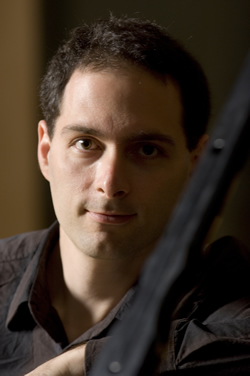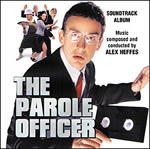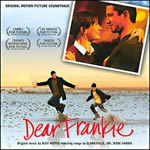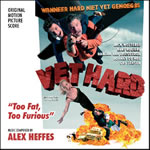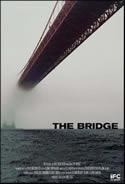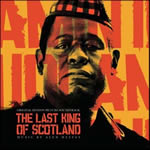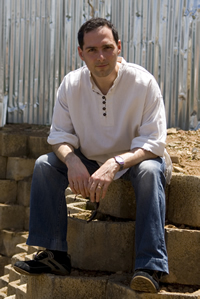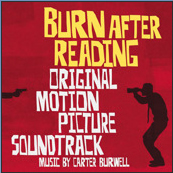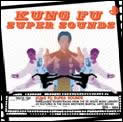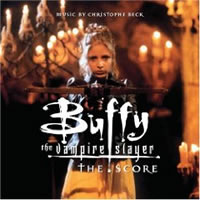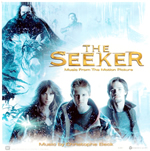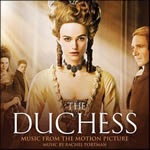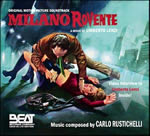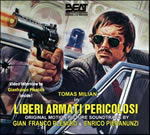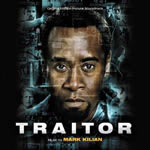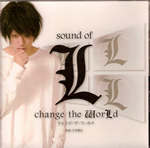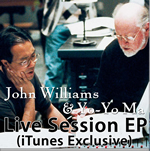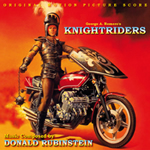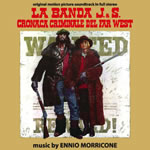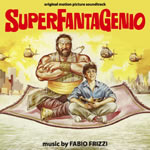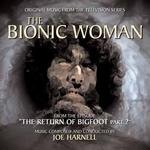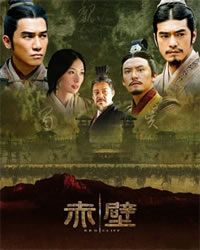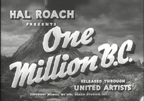 |
Soundtrax: Episode 2008-17
September 11, 2008
By Randall D. LarsonBridging the Void: The Film Music of Alex Heffes
This week we interview British composer Alex Heffes, whose notable scores for comedies (The Parole Officer, Late Night Shopping), provocative dramas (Touching the Void, The Last King of Scotland), and documentaries (The Bridge), have put him on the film music radar.Review this week examine Carter Burwell’s latest hook up with the Coen Brothers, Burn After Reading (“Burwell’s insidiously compelling atmospheres are intoxicatingly alluring and unforgettable”), and the fantastic assemblage of library music used in classic Shaw Brothers martial arts movies, Kung Fu Super Sounds (“One of the best and most significant soundtrack releases of the year”). Finally we have a Buffy, The Vampire Slayer score album, and I’m out-Xandering myself in infatuation with it (“The music is incredibly rich in emotional layers and aggressive potency; by far some of the best music that has ever graced the small screen”). We also look at Christophe Beck’s adventure fantasy score, The Seeker (“A fine score [that] really shows off Beck’s chops at scoring large-scale, interactive dynamics”), Rachel Portman’s elegant The Duchess (“As might be expected from Rachel Portman, her new score is awash with elegance”), a pair of 1970s Italian cop thrillers just out from Beat Records, Milano Rovente (Gang Wars in Milan; “A beautifully textured and highly attractive score [that] evokes a sultry, urban jazz tonality that [also] elevates the mood from street vibe to romantic adventure”) and Liberi Armata Pericolosi (Young, Armed & Dangerous; “The breezy score, heavy on harmonica, Hammond organ, flighty woodwinds, and bongos, [builds] a sense of youthful arrogance and free-spirited adventure”), Mark Kilian’s remarkably ethnic action score for Traitor (“Greatly benefits from Kilian’s articulation with Middle Eastern musical modes … while simultaneously maintaining the straight-ahead movement and motives needed for an action film like this”), Bear McCreary’s remarkably manic score for TV’s Eureka (“The music evokes an environment and a colorful community of distinct personalities”), Brian Tyler’s moodily compelling 4 Dogs Playing Poker (“Tyler’s impassioned music gives it all the life it needs, evoking mysterioso, intense foreboding, and youthful camaraderie”), and Kenji Kawai’s Death Note follow-up score, L: Change The World, where action hero replaces deadly notebook (“Aside from [its] warm melodies, Kawai’s score supports the film’s story of clinical terrorism and corporate betrayal with a fair amount of coldness”).
Plus the latest news and links to keep up with scores and soundtracks.
.
Alex Heffes Bridging the Void: The Film Music of Alex Heffes
A Conversation with the ComposerBritish composer Alex Heffes has come to note as a result of a consistent series of notable scores for comedies (The Parole Officer, Late Night Shopping), provocative dramas (Touching the Void, The Last King of Scotland), and documentaries (The Bridge).
Born in 1971 in Beaconsfield, Buckinghamshire, Heffes graduated from Oxford University with first class honors and began his professional musical career playing keyboards and writing and arranging for commercials and TV (his band is featured playing in jazz club scenes in the film Circus). This led to him becoming an assistant to composer Simon Boswell, with whom he scored over 20 movies including A Midsummer Night’s Dream and Cousin Bette. Launching out on his own with music for a series of short films, beginning in 1996, Heffes rose to international prominence with his score to Kevin Macdonald’s Oscar-winning One Day In September. Heffes has continued to collaborate with Macdonald and his subsequent films, and continues to provide very noteworthy scores for a variety of motion picture subjects, embracing a variety of musical styles, unconfined by musical boundaries. Heffes’ scores have been nominated for BAFTA, Ivor Novello, European Film Academy, and ASCAP awards. The LA Daily News said of his score to Macdonald’s Academy-Award winning film The Last King Of Scotland “[it] has the best and weirdest soundtrack I've heard all year.”
Heffes is currently scoring Macdonald’s State of Play, a drama based on the BBC mini-series of the same title, about a team of investigative reporters work alongside a police detective to try to solve the murder of a congressman's mistress.
Q: What were your first experiences in film music like for you? What was it that initially led you into film music as a progression?
Alex Heffes: I always try to keep fresh the childhood enthusiasm and excitement I had for films from a young age. That's what started me off in the direction of working in film and that's what I try to retain in my adult life. If I'm excited about what I'm doing then hopefully some of that gets transmitted back to the audience. The greatest film composers seem to have the ability to retain a freshness throughout their sometimes very long careers. That's the real mark of a true great I think.
Q: A number of your first few scores were primarily for contemporary thrillers, Killer Net, Little White Lies, Big Cat, Running Time, Circus, Mind Games. Is there a type of music that is demanded by these types of films, and if so how do you feel you have been able to invest your own voice as a composer into these scores?
Alex Heffes: Finding your own voice is a long and individual journey for each composer. What I've come to understand over the years is that the sort of work that comes your way also plays a part in this process if only in the sense of broadening your outlook and approach. Some of the early films I did required going into musical genres that were more unfamiliar to me. That inevitably led to widening my palette and stretching my technique in a very useful way. I love the diversity of film and the way it draws us into unexpected areas. Often this throws up unexpected treats too.
Q: Crust (2001) sounds like a very interesting assignment. Just how do you compose a score for a movie about a seven-foot boxing shrimp?
Alex Heffes: I feel that every composer should have to do a score involving a 7-foot boxing shrimp at some point of their career. It's a rite of passage. It's a little seen gem, although I believe it had a good life in Japanese cinemas (the film that is, not the shrimp). Actually, I'm rather fond of that score in some ways. The film is a comedy, but the director had tried taking the music down a kitsch route. I think the subject material was probably whacky enough in itself though, so I ended up doing a quite lyrical melodic score which is supposed to underpin the relationship between shrimp and master... I'll say it again: all composers should have one of these in their CV!
Q: I was very taken by your score to The Parole Officer – which also gave you some notice due to being released on soundtrack CD in England. This and Late Night Shopping gave you the opportunity to score some character-based comedy. What was your approach to these scores?
Alex Heffes: I'd worked for quite a few years as an assistant to a composer, so I'd been lucky enough to work on quite a few UK and US comedies by the time I started scoring features myself. That's an invaluable training. The idea of The Parole Officer was to counterpoint the rather mediocre bank robbers with an overblown heroic theme to make them more ridiculous. Lots of fun to do and one of the hardest orchestral sessions I've ever done. The music very quite difficult and we had very little time. Also the air conditioning broke down in the middle of the session – on one of the hottest days of the year. However, it all worked out in the end. Late Night Shopping was an opportunity to do something a bit more funky, something that I only ever need half a chance to do.
Q: I thought your score for Kevin MacDonald’s Touching The Void generated a tremendous sense of unease and drama in the midst of an overarching sense of beauty and grandeur, as befitting the film’s setting. What challenges did this project pose for you?
Alex Heffes: The main challenge for me in Touching the Void was not to make the score overly heroic in a way that swamped the picture. The approach I took was to give the score a very long and gradual build through the film so that by the time the strings are doing their biggest moment it's sort of crept up on the audience. The other challenge in that film was one of endurance. The second half of the film is literally one man crawling down a mountain. That a long time to sustain the tension so that build was all important.
Q: Trauma posed an interesting horror/thriller with a depth of psychological development in the Colin Firth character. How did you have an opportunity to investigate these psychological nuances in your music, and what elements of the film proved to be central to your musical score?
Alex Heffes: Trauma was really about finding how to represent the fractured personality and dream-like state that Colin Firth portrays. I processed much of the sounds to make them recognizable but slightly weird. I also used a slightly odd orchestral line up, with strings weighted heavier in the bottom end and only using contra bassoon and bass clarinet and harp in addition. There is a theme running through the film about ants. I did a lot of string techniques to get this across. Specifically I had the upper strings playing with the wood of the bows and had the low woodwinds clatter on their finger pads while blowing through the finger holes. Sounds creepy.
Q: You provided a gentle piano score for Dear Frankie, which also featured several songs prominently in the mix. What elements of the story first drew you as central to the score, and how did you need to skirt your music around the songs to coordinate an integrated musical design?
Alex Heffes: I wanted to use the piano prominently in this score and to have a theme that was child-like but with some extra maturity to it – rather like the character of the little boy Frankie in the picture. It turned into a mini piano concerto by the end of the film. The beauty of this approach was that solo piano cues could be very intimate and simple and the emotional maturity required to raise it above that level could be achieved by adding orchestral elements as needed. I did actually score one of the long song sequences in the film, but that cue was never used. I always try and work around the songs in a film so that it doesn't jar when cues have to segue in and out of them.
Q: Vet Hard gave you another opportunity to compose a varied and exciting score for a somewhat manic comedy, with music ranging from wild chases to tender interludes to quotes from Wagner. What did you find most interesting about this assignment?
Alex Heffes: This crazy Dutch film was a lot of fun and has some amazing action sequences. That's really what attracted me to it. I think the director has a natural eye for really stylish action. He'd be great for Bond I'm sure one day. It's also very funny, but in a rather dark and sometime alarming way. Lots of energy though and that's always attractive.
Q: You composed an especially sublime score for the documentary The Bridge, about the prevalence of suicides on the Golden Gate Bridge. The music matches the beauty of the structure and Eric Steel’s gorgeous photography, while belying the haunting subject of the film. How did you decide what kind of music was appropriate for the film and how did you develop that approach throughout the film?
Alex Heffes: For me The Bridge was really about being sensitive to the subject material. Suicide is one of our last taboos in society, and it's surprising how difficult it is for people to discuss in film or otherwise. I didn't want the music to be overly dramatic or morbid. I thought I'd rather follow the poetic side of the film while trying to remain sensitive to the notion of over-romanticizing the Golden Gate Bridge as a suicide spot. That's not what the film is about; it's about discovering what it was in the lives of those people that drew them to the bridge. It's a serious piece of work and I'm glad that many people have responded positively to the film and the music.
Q: You reunited with director Kevin MacDonald for The Last King Of Scotland, another visceral drama based on a true story. Your score has a very interesting and authentic-feeling texture to it through the use of African instruments added to the mix. How did the film’s setting and historicity, and the multiple perspectives you seem to be supporting in the music, affect the score’s direction and thematic unity?
Alex Heffes: I went out to Uganda before the film was shot and we recorded much of the African music with local bands, singers, and a choir. This was a fantastic way of getting to understand Ugandan culture from the inside. When it came to scoring the rest of the picture back in London I already had a head-start from that experience. The director was keen for the music to get across how music was in the 1970's in Uganda rather than just a generic idea of ‘African’ music, so I'm glad you think there are multiple perspectives there. I think that because I was involved in recording and producing much of the source tracks that it was easier to keep a unity of all the different elements going in the film.
Q: Your score for Tsunami: The Aftermath, a TV miniseries about survivors of the devastating 2004 Indian Ocean tsunami, seemed to evoke tragedy tinged by hope. How did you decide the best way to support this miniseries with music and how did you develop the score over the show’s duration?
Alex Heffes: Once again, in treating difficult subject material it was necessary to be cautious with the score. However, this doesn't necessarily mean just play the music quieter. It's necessary to design the music so that it doesn't emotionally swamp the material on screen. The first part of the drama is about the physical aftermath of the disaster, the second part is more about the political fallout and turns into more of a political drama. I tried to have the music portray this.
Q: Kevin MacDonald called you in to score his documentary on Klaus Barbie, My Enemy’s Enemy. What sort of music was required for his treatment of history?
Alex Heffes: Scoring this was about finding a musical analogue for the character of the infamous man. To many people he was simply the old European man living next door; to his victims he was a brutal and mercenary criminal. The music tries to portray this two-faced character with a waltz that has dark hints of what lies beneath. It was interesting to follow Barbie's geographical relocation from Germany to South America in the music. I combined a German military march with some Bolivian percussion instruments to give this effect.
Q: Aside from a fistful of thrillers early in your career, you’ve had the opportunity to compose music for a variety of different types of films without becoming typecast. How have you found your career thus far, and what do you hope for the future? Where would you like to be, filmusically, in another five years?
Alex Heffes: I'm always grateful for the diversity. I just hope to continue working on great projects, try and get better at what I do and continue being excited as I was when I first started noticing film music as a child. If I can communicate that then I'll be happy.
Special thanks to Jo Carpenter for facilitating this interview with Mr. Heffes.
For more information on Alex Heffes, see his web site at www.alexheffes.com
New Soundtrax in Review
Carter Burwell’s latest for the Coen Brothers, Burn After Reading, is on iTunes and amazon digital now, and comes out on CD from Lakeshore on the 16th. The score is as dark and brooding as any of Burwell’s scores for the Coen’s earlier macabre mysteries – a return to the moody ambiance of Blood Simple and Miller’s Crossing with a kind of Phillip Glassian minimalist touch evident in the swaying violins. Burwell sets up a brooding atmosphere of acoustic tonality from the get go, with layers of weighty piano and violin measures, wafting like heavy fog across the movie’s soundscape. These are offset by timbered percussion pieces that pound like heavy footfalls, that clatter like the tonality of haystacks made of a billion drumsticks, that clash like the forest scuffles of giants, aggressive and thump-laden. The percussion becomes pervasive and all-powerful, offset against the ominous cadence of the atmospheric material, keeping it from providing anything but a settling-in rhythm, devoid of any emotional statement. Burwell takes the percussion action music that has been heavily used in martial arts and action scores of later and amps it up to a deadly duel of clattering drum sticks and heartbeaten skins. This is Tan Dun on steroids, Kodo versus the Blue Man Group in a shadowy back alley, Ron Bushy in a bowling alley cage match against Keith Moon. “I felt early on that the music cannot afford to say too much about what exactly is going on,” Carter noted about this score on his web site. “In fact my first thought was that, in an effort to avoid any emotional comment at all, the score should be mostly percussion. Somewhat surprisingly that turned out to be true. The attraction of percussion was that it could lend an air of sobriety, gravity, and bombast to the general silliness [of the film]. It could seem important without saying why it was important. Meaningful without any specific meaning. An inspiration was Jerry Goldsmith's largely-percussion score to Seven Days in May.” The score is evocatively powerful, intentionally overbearing, and plays precisely the straight man to the manic comedy of the Coen’s presentation. “The Struggle for Ebullience” is an effective combination of the score’s two contrapuntal nuances – the atmospherics and the drum-voiced action material, layering each in and out of one another in a captivating ambient duet. “Breaking and Entering” a mesmerizing suspense piece, a menacing reflection of drums and languid low bass, punctuated by severe undulations of strings and moaning synth. “Honey Nut Cheerios” reprises the main theme with low, portentously plodding advancements. “Who Do You Think You Work For?” accelerates that cadence into a compelling poignancy, investing just a slight evocation of feeling – generally one, as is typical of both Burwell and the Coens – of unremitting hopelessness, of destiny spoken and fate sealed, the characters making their way through a maze whose exit is only found in doom. At just under 36 minutes, it’s a fairly short album but each cue is a gripping listen, even at an average of 1.5 minutes each; Burwell’s insidiously compelling atmospheres are intoxicatingly alluring and unforgettable.
Those of us addicted to the classic Shaw Brothers martial arts movies of the ‘70s and ‘80s – especially now that they’re becoming available on DVD in their original language and undistorted original coloration and set design rather than the horrible edited and dubbed versions that played in American grindhouses and made martial arts movies a bad joke – recognize that most of the music for these films was not originally composed. Where individuals were credited with music, they were primarily music supervisors and compilers, or else wrote partial original music which was supplemented by library and lifted music for the whole soundtrack. The music they selected was quite often anybody else’s score. Morricone was a frequent target, his music lifted from Italian Westerns and action films with free abandon and inserted into a kung fu movie with little guilt, making for a very strange listening experience for those of us accustomed to hearing ‘60s and ‘70s Morricone in his original Italian cinematic environment. I was watching the Shaw Bros. kung-fu horror film Human Lanterns a couple of weeks ago only to find Akira Ifukube’s theme from Majin: The Hideous Idol used in a couple of pivotal scenes – and no hideous idol anywhere in site. The practice eventually came to a stop, and Asian cinema is now renowned for its original scored and a Buddha’s fistful of splendid composers. Anyway, back to the 70s… in addition to lifting from soundtrack albums, Shaw Brothers also licensed library music from professional libraries such as that of England’s De Wolfe Music Library, a source library of music used in numerous film and television projects since 1909 (yes: Nineteen Oh Nine!). A lot of the music you heard in those Shaw Brothers kung-fu classics were written for and housed in De Wolfe’s library. Now De Wolfe has released some of the best and most innovative library music used in the Shaw’s kung-fu classics in Kung Fu Super Sounds. Re-mastered and sounding as good as they did way when we first saw them in drive-ins or grindhouse theatres, De Wolfe Music Library has herewith curated and compiled some rare slices of Hong Kong’s Shaw Brothers OST ephemera. The 43 track, 76-minute album includes original library cues used in Return To The 36th Chamber (1980), The Bastard Swordsman (1983), Dirty Ho (1979), Invincible Shaolin (1978), The Kung Fu Instructor (1979), House Of Traps (1982) , My Young Auntie (1981), Flag Of Iron (1984), Shaolin Mantis (1978) and many more Shaw Brothers cult classics. The album is simply one of the most exciting soundtrack releases in recent years. Not only is the music incredibly nostalgic for those of us who remember these films – or have discovered them anew on DVD in recent years – but the music is really quite terrific. Most of what made it into these kung-fu punch-and-kick-fests was light-hearted contemporary pop action – think Morton Stevens, Joe Harnell, early Billy Goldenberg, and the like. You may or may not recognize the names of the composers – Reg Tilsley (The Haunted House of Horror), Paul Ferris (Witchfinder General), Roger Webb (The Godsend; Death of a Centerfold), but they all contributed or licensed their music to De Wolfe’s vast archives, where it found use throughout Shaw’s wonderful library of martial arts movies. The tracks here range from the boldly energetic (Edward Michael’s “Rite De La Terre-Earth” as used as the theme in Avenging Eagle (1978), the raging battle music “Violence” by Eric Towren from Invincible Shaolin (1978), the strikingly textured exotica of Derek Scott’s “Two Minutes Precisely” from Ten Tigers of Kwang Tung (1979), the breathtaking enervation of Reg Tilsley’s “Industrial Complex” from The Master (1980), Pierre Arvay’s masterful percussion array “The Mystified Man” from Flag of Iron (1980), the doom-full chiming keyboards and bells of Eric Towren’s “Abimes Souterrains” from the aforementioned Human Lanterns (1982), the Schifrinesque jazz riffing of Tilsley’s “Tension Trip” from 1979’s Dirty Ho, or Don Harper’s splendid keyboard melange “Troubled Mind” from the same film. Or Sam Spence’s quirky “Moog Shot 25” from Buddha’s Palm (1982). The cues average in the 1.75 minute range, but they are so infectious and likable and effective in working their martial arts accompaniment magic, and they are so compatible together, that Kung Fu Super Sounds is definitely one of the best and most significant soundtrack releases of the year. Virtually none of it has been released before, heard only amid the gargantuan slaps and cosmic punches and other enlarged sound effects of kung fu cinema. This and another release from De Wolf, Bite Harder, a compilation of 70s groove tunes and backbeats licensed out for use in any number of films, provide the rare opportunity to hear this terrific music on its own.
www.dewolfe.co.uk
Emmy-award winning composer Christophe Beck scored, mixed and produced Buffy the Vampire Slayer – The Score CD, which was released this week by Rounder Records. After several song-based Buffy music albums (songs used in the shows), Beck’s outstanding underscore can now be appreciated outside of the several bootlegs it had previously been available on. The Score contains 29 tracks, all drawn from seasons two, three, four, and five of the cult TV favorite Buffy – which Time Magazine chose as one of the “100 Best TV Shows of All Time.” Beck scored practically all of “Buffy” series, including “Once More, With Feeling,” the musical episode and soundtrack that sold over 200,000 copies in the U.S. and earned him an Emmy nomination for "Outstanding Music Direction;" he also received an Emmy for "Outstanding Music Composition for a Series" for his work on the episode “Becoming.” While the alt rock performed by various bands at The Bronze, Sunnydale’s popular teen hangout and nightclub, provided much of the Buffyverse’s angst, Beck’s music provided both its soul and its bite. From traditional if only slightly Gothic-tinged horror music to the warm, emotive melodies that really endeared the show and its characters to audiences, Beck brought all of the Vampire Slayer’s multifaceted components to life. With 29 tracks from three seasons (more than half of the album comes from Season 4), the selections cover many of the most significant musical moments of the show (the show’s most powerful episode, and the single most potent moment of television I have ever seen, the Season 5 episode “The Body,” where Buffy discovers her mother deceased and deals with the aftermath, contained no underscore, intentionally filmed as cinéma vérité). The soft poignancy of strings and voices in “Remembering Jenny,” where Giles places flowers on the grave of his would-be lover, slain by Angelus; the comical violin scherzo accompanying Xander’s love-spell gone wrong from “Bewitched, Bothered, and Bewildered;” the recurrence of the tender Buffy/Angel love theme, “Close Your Eyes,” in tracks like “Moment of Happiness” from “Innocence,” where a night a passion turns Angel back into Angelus; the energetic fight music between Buffy and Faith, “Faith’s End,” from the 2-part Season 3 finale, “Graduation Day,” with its shrieking horns and cataclysmic percussion and ascending synth tonality that gives way to Beck’s impassioned synth and violin reflections; the dramatic orchestra and choir of “Drink Me” from the same episode, and the tender violin soliloquy “One Last Moment.” The supremely spooky violins and chorus from “Golf Claps” from the brilliant 4th Season episode, “Hush” and the ferocious orchestrations of “The Princess Screams” from the same episode; the four energetic cues from “Restless,” wherein each of the characters’ dreams take a dark and twisted turn, affording four distinctive modalities, and the four tracks from the climax of the 5th Season finale, “The Gift,” where Buffy sacrifices herself on behalf of her friends, which contains some of the show’s most intensely passionate and powerful music (and in a show where intensely passionate and powerful music was the norm, this is really saying something). The music here, as it has been throughout the series, is incredibly rich in emotional layers and aggressive potency, it’s by far some of the best music that has ever graced the small screen.
The selection and sequencing, while not always in strict chronology to the season’s broadcast order, is arranged for most effective listening, and since each episode was, for the most part, its own musical entity, the rearrangement of a few episodes should not be of concern, even to purists. Also, the selections do not duplicate any of the cues that were on previous compilation albums (the straightforward version of “Close your Eyes” on Buffy: The Album, or the suites from “Restless,” “Hush,” and “The Gift” that were included on the Once More With Feeling cast album, so everything that appears on The Score is a premiere presentation (promos and boots notwithstanding) You don’t need to be a Buffy fan to appreciate the powerful fragrances of Beck’s music from the show; it’s strength and emotive intensity is evident on its own; and capably relayed through this important collection of musical moments. With a handful of song-based albums, we’ve waited far too long for a true score album to emerge. Thanks to Beck and Rounder Records for having finally filled the gap.
For more background on Beck’s Buffy scores, see:
http://en.wikipedia.org/wiki/Music_in_Buffy_the_Vampire_Slayer_and_Angel
Bridging the gap between Buffy and now, Christophe Beck’s lively and provocative score for 2007’s The Seeker: The Dark Is Rising has been released by Fox Music as an online download from iTunes and other sources. The film, based on the Susan Cooper novel series, is one of the new trend of hero youths and epic fantasy adventures (think: Spiderwick, Terabithia, etc.), about a boy who learns that he is the last of a group of immortal warriors who have dedicated their lives to fighting the forces of the dark. Beck’s score, presented with 18 tracks and nearly 50 minutes of music, is a richly epic quality score. An eloquent 3-note ascending main theme for French horns, “Will’s Theme,” gives the adventure a musical warmth and humanizes the story’s vivid fantasy. Originally introduced for a fragility of piano and light strings, emerging out of a mist of bell tree, the motif develops rhythmically in “Walk to Party” and finally comes into its own in “Will Is The Seeker,” the triumphant moment when boy meets his destiny. “The Rider” introduces Beck’s furious, ultra-low horn motif for the film’s baddie, an evocative, cavernous tonality with is mixed with fragrances of choir and of Will’s Theme as it develops. These motifs will interact throughout the score as do the characters until Will’s quest is complete. “Demise of the Rider” brings us into Zimmer/Jablonsky territory with a fast paced riffing from violins that underscores a slow-moving cadence of first brass and then strings over choir, segueing into a raging torment of low horns and a triumphant figure for strings over timpani, finally evoking ethereal tendrils of solo violin over a crushing denouement of low winds as victory is finally had over evil. In between there are a variety of masterful action cues, epic-styled battle music, and splendidly textured orchestral performance; “Huntercrombe Manor” is an especially muscular action piece, cataclysmic in stylized textures and interwoven motifs, raging forth with aggressive activity. “Apocalypse” is as it sounds – a compelling final showdown between good and bad, interoperating thematic, and intense orchestration. This is a fine score and really shows off Beck’s chops at scoring large-scale, interactive dynamics.
As might be expected from Rachel Portman, her new score for The Duchess, Saul Dibb’s chronicle of the life of 18th Century aristocrat Georgiana, Duchess of Devonshire (a direct ancestor of Princess Diana), who was reviled for her extravagant political and personal life, is awash with elegance. The film stars Keira Knightley and Ralph Fiennes, Lakeshore releases the soundtrack online and on CD on Sept 16th. Portman’s score is richly evocative of the period, smoothly light classical in style and tone, but with a now-contemporary melodic structure that immerses itself in all things Georgiana (“Gee”), not unlike the manner in which Knightley’s brilliant performance likewise immerses itself in the character’s personality and being. The music evokes all of Gee’s nuances – her glamour and beauty, her drive and loyalty to her office, her dismay over her disinterested husband (Fiennes), her seeking fulfillment via various liaisons, her disillusionment with and eventual disrespect from family and society alike. The score is therefore as turns very passionate, delightful, spirited, and poignant, performed with a string-heavy orchestra very much in the 18th Century style; with “Six Years Later” a wonderful transitionary piece in a captivating classical style, full of vigor and life. “Gee Give Up The Baby,” on the other hand, is gloomy and dour, evoking much of the dismal rhythm of “Rape,” heard earlier with its heavy strokes of violins mired in a murky wash of sustained strings and piano, and the empty, echoing piano hits of “Awakening.” The score, as the film and its real-life inspiration, ends somberly (the melancholy reflection, “Some Things Too Late, Others Too Early,” “Gee Is Taken To The Country,” etc.), yet the spirit of the lady and the whole of her life evoked nicely in a recapitulation of happier moments in Portman’s End Title suite. The soundtrack album includes two classical pieces (one of Beethoven’s “Twelve Dances,” Joseph Hayden’s “Adagio from String Quartet”) which, while somewhat distracting due to their familiarity, blend in nicely with the score’s musical milieu.
Italian composer Carlo Rustichelli was a master of every genre of film made popular in Italian cinema, from peplum to Westerns to the Italian police thriller. With the latter making a pronounced comeback in soundtrack releases this year, Beat Records has issued Rustichelli’s splendid contemporary detective score from Umberto Lenzi’s 1973 gem, Milano Rovente (Gang Wars in Milan; aka Burning City) soundtracks from the label, marked by limited quantities from 500-3000 copies, gorgeous digipack cases featuring the amazing poster art from these films, multimedia content, and fold-out poster styled notes about films and music. In Milano Rovente, the composer evokes a sultry, urban jazz tonality from the get-go, with a persuasive metropolitan saxophone melody introduced in “From Sicily To Milan;” but it soon segues into his secondary theme, a compelling and very nostalgic sounding keyboard melody over strings and drumkit that elevates the mood from street vibe to romantic adventure. It’s really quite a breathtaking theme, which meets its antithesis in a kind of reverse variant in the concluding track, “From Milan to Sicily,” which reprises the melody from mandolin and piano before returning to the original orchestration, beautifully punctuated by jews’ harp and continued mandolin, in a kind of somber, Nino Rota/Godfatherish denouement. These two themes are central to the score, and will represent first the urban milieu, and then the melancholy and spiritual strength of the film’s protagonist – a Milan produce vendor (Antonio Sabato) who moonlights as a pimp, who faces off against a ruthless and greedy French gangster (Philippe Leroy) who wants to unite the organized crime ring of Italy. The main themes are given some evocative variations throughout the score. “Some Girls, Some Murders” offset the urban theme against a bed of bongos and other percussion, before morphing into suspenseful and meandering figures and fragments. “Fascinating Jasmine” proffers is for muggy sax, organ, and mysterioso strings, as does “Thieving and Thieves.” It takes a danceable turn, rearranged for a 60s jazz-dance number in “Just A Bite,” replete with electric guitar and piano. The nostalgia theme is very nicely represented in “Remembering a Far Home,” with its hushed and reflective piano, organ, and soft strings; “Girls and Drugs,” gives it a haunted rendition for strings and jews’ harp; the cue also includes a terrific action motif for fast-flowing violins and horns over a rushing wave of drums, a motif and progression that will recur in “Flic’s Compromise” and “Running and Hiding.” “Still Remembering” reprises the nostaglia theme for whispers of organ, piano and quiet strings. In addition to score tracks, the album includes a couple of source cues, one a cute beat-pop tune, “Fly 747,” the Sicilian folk standard, “Vitti ‘na Crozza,” sung by the cast during an unforgettable murder sequence, and a song written by Morricone’s harmonica player Franco De Gemini with Stefano Torossi, “What Is This Love?”, sung by then-popular songstress Melody. This is a beautifully textured and highly attractive score, very nicely brought together into a very likable package. The album includes an alternate take on the final track, and a 15-minute mp4 video interview with director Lenzi about the film and working with Rustichelli on its music. Lenzi is speaking Italian but the video includes horizontally scrolling English subtitles (they seem to be paraphrasing his statements, but we get the gist of what he’s saying just fine).
www.beatrecords.it
Beat has also issued the score to Liberi Armata Pericolosi (1976 - Young, Violent, Dangerous), with music by Gianfranco Plenizio and Enrico Pieranunzi. Described by one imdb poster as “Silly '50s style juvenile delinquent flick with a '70s Eurotrashy touch. Three teenaged punks kidnap a rich girl and force her to accompany them as they terrorize the streets of Milan. Fun car chases in dumpy Euro-subcompacts and a surprise ending add to the fun,” the film has survived the scorn of its contemporary critics and is now valued as a respectably-flavored entry in the genre of Italian cop movies. The breezy score, heavy on harmonica, Hammond organ, flighty woodwinds, and bongos, is the perfect accompaniment for these escapades, building a sense of youthful arrogance and free-spirited adventure right into the score’s sonic atmospheres. This tonality is featured throughout the score, which lays on tuneful riffs rather than providing dramatic underscoring, but the vibe was clearly appropriate to the film and the mindless violence-as-party attitude delineated by its protagonists. A softer tonality is heard in the film’s ballad, performed by organ and harmonica on Track 14, by voice on Track 17, and sung in Track 18. The score also includes some bravura performances on saxophones (listed to Track 8 and be astonished) that stand up as sheer jazz pieces, as well as a couple of classical pieces (tracks 9, 13, 15, 16). The album includes an mp4 interview with Plenizio about the score and the participation of pianist Pieranunzi, whose keyboard interpretations were considered so inventive that Plenizio gave him co-credit for the musical score.
A taut international thriller set against a jigsaw puzzle of covert counter-espionage operations, Traitor, from writer/director Jeffrey Nachmanoff (screenwriter of The Day After Tomorrow). co-stars Academy Award nominee Don Cheadle (Hotel Rwanda, Crash) and Guy Pearce (Memento, L.A. Confidential). Mark Kilian as provided an ethnic and elegant score, released on CD and download by Varese Sarabande. Kilian initially gained notice for his collaborations with Paul Hepker for Tsotsi and Rendition (see interview in my Nov 5, 2007 column). Last year Kilian independently scored Before the Rains (enthusiastically reviewed in my June 19 column) and for the award-winning documentary Without the King. Familiar with ethnic musical traditions and comfortable with traveling overseas to research ethnic music for scores such as these, Traitor greatly benefits from Kilian’s articulation with Middle Eastern musical modes grounds the score, and its character, a devout Muslim and former US Special Forces operative, in a musical environment teeming with ethnic flavorings and old world atmospheres, while simultaneously maintaining the straight-ahead movement and motives needed for an action film like this. Most of the action music in the film is derived from ethnic rhythms and instrumentation, while the film’s more poignant emotive music (like “Omar and Horn Say Goodbye”) is clearly the product of a Hollywood musical tradition – all of which works very well for the film. The music speaks both for the environment and what most audiences will think of when they think of Muslim environments (while Kilian provides enough contemporary urban flavorings to the score to evoke the idea that Islam is not simply a religion of the ancient Middle East, but of the modern world in which Don Cheadle’s character thrives) while also supporting the characters’ emotional underbelly with more familiar, Western musical lines (“Traitor Theme”). By embracing the musical idiom that he has, and crafting his score almost entirely out of its cloth, Kilian’s score also supports the film’s ideas that Muslim does not necessarily equate to terrorist and that the term, while not mutually exclusive is neither a synonym. Kilian evokes the philosophy that drives Cheadle’s character through his choice of instrumentation and texture (more so, I think, than simply evoking the Moroccan environment), and then wraps his score around those elements, keeping the character’s viewpoint always at hand while structuring around it a first-rate action score. The music’s intermixing of West-meets-East is never overbearing and is often put to very interesting use, as in the fusion of French pop layered with Middle Eastern flavoring in the sung vocal, “Laiusse-Toi Aller” and the African folk traditions involved by “AyadDjidjé,” while the touch of a poignant female voice (replacing what had hitherto been ethnic woodwinds in “Traitor Theme” and its reprise in “Do We Stop?” and “Fatwa On You”), is drawn not so much in “The End” from Middle Eastern music as from more Westernized film music traditions as it evokes the film’s unhappy denouement. This is an excellent score with much below the surface, and an unusual but powerful tonality, as is characteristic for its composer.
Bear McCreary’s music for the TV series Eureka is far different from what we’ve heard on Battlestar Galactica with its intricate ethnic aromas and textural grain, or his mix of the malevolent and mechanistic with the moving and sensitive in Terminator: The Sarah Connor Chronicles. Eureka, now available on CD from La-La Land Records, is a quirky sci-fi comedy which has little to do with the northern California city but lots to do with a kind of grown-up Eerie: PA community in which scientific achievement has been centered and engendered over the years. But in his music, McCreary ignores the science fiction elements of the story and concentrates on the characters and the small-town setting (in actuality, Eureka is the largest city in California’s northern redwoods, far from the small town depicted in the show). With a main and end title theme by Mark Mothersbaugh & John Enroth that evokes breezy quirkiness. McCreary expands that idea into a colorful array of sonic treasures. Bear has called his score “a twisted blend of folk, blues, and zydeco with 80s New Wave synths, 8 and 16 bit video games, 70s keyboards and a twist of flamenco. It's delightfully insane music.” The music evokes an environment and a colorful community of distinct personalities, from the gently Americana-ish “Allison’s Theme” to the rampant percussive and acoustic guitar rhythms of “Through The Vortex,” the severe art-zydeco rhythms of “Victor’s Getaway” and the hard-edged synthetic dance beat and breathy exhalations of “EurkAerobics,” or the mix of scratchy backwoods guitars with the modernity of hip-hop scratching in “The Heathers.” Perhaps “Sheriff Carter’s Theme” evokes the color of the Eureka score best, with its sinewy little warbling keyboard theme emerging into Carter’s own roughly voiced growling vocal. Other character themes evoke unique elements of Eureka’s idiosyncratic population, as in the furtive keyboard tonalities over shaker of “Fargo’s Theme” or the eloquent but slightly secretive flamenco guitar notes of “Henry’s Theme” and the slide guitar acoustic rhythms of “Taggart’s Theme.” The town itself has a theme, which Bear will evoke in lieu of the Mothersbaugh/Enroth title tune; “A Town Called Eureka” evokes small town simplicity and freedom, an amiable tune for guitars and keys and shaker and other oddball percussion that may hide more than it reveals – just like the show’s version of Eureka, CA. Episode scores are made up of interactions of all of these themes, and much more. With 28 tracks from ten episodes, and six standalone versions of his primary character themes, the 77 minutes of music presented on this disc is extremely variegated in texture, tone, and style. It’s also a ton of fun.
For more information on Bear and his ongoing scoring process, see: www.bearmccreary.com/blog
Brian Tyler’s score for 4 Dogs Playing Poker, a 2000 trust-game crime thriller from Paul Rachman that came and went without much ado, has been made available as an online downline from the usual cyberspace music stores. The movie is about four friends who steal a valuable statuette for a dangerous black market art dealer, then lose it and are forced to play a deadly bluffing game to save their lives. While its plot seems a little tenuous with its grasp of reality, Tyler’s impassioned music gives it all the life it needs, evoking mysterioso, intense foreboding, and youthful camaraderie. His main theme is a splendid orchestral wash that introduces an acoustic guitar variant of its melody that suggests the Argentinian locale where the statuette is stolen, grounding the film’s primary motif with the environment that is the source of the friends’ problems. Tyler’s main theme is a winning, assertive melody that is given a variety of turns throughout the score, most often for impassioned violins or solo acoustic guitar. A frequent hard-edged rhythm, embodied especially well in “Insomnia” and “Prep to Die,” gives several cues a prominent rhythmic beat and drive. A sultry trumpet motif in “Smoke” persuasively evokes a reflective mood, mirrored later in “Quatro Dogs,” a final commentary on the dysfunction of the four friendships, while “Gun Romance” is all about ominous choices, its sustained, portentous strings portraying a big of the main theme in its ill-omened midst. “Overdose” is heavy in gloomy voicings and dour cello, an uncompromising and weighty ambiance with the mass of planets. “Vamping Blonde” is keyboard, strings, and drumkit, a provocative walking motif; “Deposit Box” contains a really cool retro organ solo that could have some from Booker T. “The Heist” (parts 1 and 2) are compelling action pieces, given a strident low drum and fuzzy synth beat, over which the main theme reflects from piano, embellished by synth choir, synth effects, and plenty of foggy reverb. Really a nice set of action cues that both drive action and continue to reinforce the film’s subtext of inevitability and the inescapably result of bad choices. Tyler’s “End Title” is a fine recapitulation of the score’s thematic elements but one that extends and resolves the film’s over mood of unhappy inexorableness, the declarative finality of Tyler’s drum beat crashing like the heartbeat of fate over the ongoing rhythmic of relentless and cheerless gloom. A thoroughly captivating conclusion to a fine score.
Kenji Kawai follows up his score for the Japanese cult-favorite horror shockers Death Note and Death Note 2: The Last Name, with a lighter and more heroic score for the spin-off feature, L: Change the World (2008), incorrectly called in some places Death Note 3. It’s not so much a sequel to Death Note 2 as a spin-off involving the fascinating character of L, the quirky mastermind investigator who faced off against the megalomaniacal killer Kira. In the Death Note films, Kira finds a notebook dropped by one of the gods of death; anyone’s name he writes in the notebook will die. Kira becomes judge and jury and begins ridding the world of unfavorable people – and, eventually, anybody who gets in his way. The enigmatic genius L, brilliantly portrayed with magnificent geekiness by Ken’ichi Matsuyama, must discover a way to thwart his abilities without getting his own name written in the book, but he does so only at the cost of his own life several weeks later. Dispensing with the dark sensibilities of Death Note 1 and 2, L: Change the World makes L into an action hero, depicting his involvement to save the world from a deadly virus terrorist plot in the 20 days between overcoming the murderous Kira and his own demise as occurred in Death Note 2. L: Change the World intersects that of Death Note 2 in several places as it’s getting going, but soon emerges into its own story. It’s not really a fantasy (except for the brief appearance of Ryuk, one of Death Note’s gods of death and a couple of references to the “death notebooks” of that film and its predecessor) but a well scripted action story which I found quite compelling. By humanizing L so much and giving him a fairly heroic if standard action-adventure storyline, though, the film departs somewhat from the brilliant mind-games the character was so noted for (at the same time, seeing L taking an active and energetic role in saving the pair of kids at the story’s center, with a climactic fight on board an airplane about to take off, is kind of cool). Kawai’s frequently impassioned musical score opens with a brief reference to the primary themes of the first two Death Note films – the relentless drumming cadence that signifies the inevitability of fate as determined by the death notebooks, and the sustained passage that reflected L’s sacrifice in payment for defeating Kira. L: Change the World opens with a slow and respectful but tragic swaying string sustainment, which segues into a rhythmic beaten cue for strings over drums in fairly fast cadence. Kawai instantly recalls the sorrow of L’s sacrifice, and then reprises the inevitable rhythm of the Death Note motif, recalling why L made that sacrifice – and then it’s gone and Change the World musically assumes its new direction.
The music frequently maintains Death Note’s relentless forward movement, but it is also dappled with a pretty keyboard theme, later taken by strings, representing the innocence of the two genius kids who are caught up in the plot. A tender violin melody evokes the friendship L develops among these kids, and the influence they themselves have upon him. Aside from those warm melodies, Kawai’s score supports the film’s story of clinical terrorism and corporate betrayal with a fair amount of coldness. The composer’s severe synth tonalities and sampled chorale material evoke both his drive to stop the terrorists and his seeming inability to do so, while also sustaining the terrorists coldly inhuman zeal to destroy humanity. As the story plays out to is satisfactory conclusion – with car chases, railway escapes from police and terrorists alike – Kawai accompanies all with progressive rhythms and tonalities. Heavy action material for drums, synth and choir energize L’s final confrontation and victory over the terrorists. Epic strings and choir and synths evoke the film’s final resolution; then a coda consisting of a pretty piano and cello melody, “Near,” concludes the film with a soft satisfaction. It’s a very nice score that supports its story well, while remaining mostly accessible and likable on disc.
Film Scoring News
The World Soundtrack Academy has released the list of nominees for World Soundtrack Discovery 2008. The name of the winner will be announced on Saturday, October 18 on the closing evening of the Ghent International Film Festival in Belgium. Every year the advisory board of the World Soundtrack Academy chooses a “Discovery ot the Year” to celebrate emerging film composing talent. Famous composers as Craig Armstrong, Michael Giacchino and Gustavo Santaolalla were discovered by the board.
The nominees for 2008 are
• Tuur Florizoone for Moscow, Belgium
• Mark Kilian for Before the Rains
• Marc Streitenfeld for American Gangster
• Velasquez Fernando for El Orfanato (aka The Orphanage)
• Benjamin Wallfisch for The Escapist
For an overview of all nominees and more info on the Ghent festival: www.worldsoundtrackacademy.com
Danny Elfman is set to score Universal's upcoming remake of The Wolf Man. The film, directed by Joe Johnson and starring Benicio Del Toro as Larry Talbot, Emily Blunt as Gwen, Anthony Hopkins as Sir John Talbot, Hugo Weaving as Det. Aberline, and Geraldine Chaplin as Maleva the Gypsy Woman, is scheduled for an April 3, 2009 release date.
Hans Zimmer will score Angels and Demons for director Ron Howard, the sequel to their hit film version of The DaVinci Code. Film comes out on May 15, 2009, and will star Tom Hanks reprising his DaVinci Code role of Robert Langdon, with Ayelet Zurer, Ewan McGregor, and Stellan Skarsgård
John Williams and Steven Spielberg have teamed up once again for a short film project. A Timeless Call was premiered at the Democratic National Convention as a tribute to veterans of all wars. Written by Lorna Graham, the piece was narrated by Tom Hanks and produced by James Moll (director of the Spielberg produced Oscar-winner The Last Days) and American Beauty producers Bruce Cohen and Dan Jinks. The original score sees Williams create a somber and noble mood with lone piano and typically Williamsesque trumpet solos and strings, very much in the vein of Saving Private Ryan and Born on the Fourth of July. It’s another example of the composer being the unofficial composer laureate for the United States and is the second short film project he has ventured into with Spielberg – the first being American Journey, produced at the turn of the century. That score eventually made it onto the ‘American Journey’ album (known as ‘‘Call of the Champions’ in the UK), so hopefully A Timeless Call will feature on disc in the future. It’s not on iTunes; but you can watch the film and hear the score on youtube at www.youtube.com/watch?v=JLq8hmmxcOA
A Timeless Call may not be on iTunes but an iTunes exclusive called Memoirs of a Geisha – Live Sessions is. It’s a 4-track mini-album downloadable for $3.45 that includes three tracks from John Williams’ score, specially arranged by him for cello (performed by Yo Yo Ma) and piano for this iTunes session. The album download includes a 10-minute interview of Williams and Ma discussing the studio, the music, the movie, their work together. Williams describes the recording as “a private music making session – something we may just do around the living room.”
British movie maestro Debbie Wiseman has two television projects coming up later this year, with The Lost Diary of Rutka Laskier coming soon to BBC Television, followed shortly after by Fry In America. The former takes in the story of the titular Jewish teenager, known as the Polish Anne Frank, who kept a diary during the final months of her life during the Nazi holocaust, before she was transported to Auschwitz, while the latter looks to be an entertaining and interesting travelogue as Stephen Fry takes in all fifty of the United States, in search of the real America. As those air, the composer heads to the scoring stage once again, this time for the forthcoming horror comedy Lesbian Vampire Killers – most certainly the best title in her filmography thus far. The film, from the producers of the BBC’s hit comedy series Gavin & Stacey, sees a group of women ensnared in a shadowy cult which sees them having to round up local men for sacrifice on the welsh moors. The film isn’t due until March 2009. – via musicfromthemovies.com
Canadian born composer Andrew Lockington’s score for the indie film One Week, for a film directed by Michael McGowan, premiered at the Toronto International Film Festival on, September 8. One Week asks the question, “What would you do if you had one week to live?” and is about a young man (Joshua Jackson) who, thus confronted, and takes a road trip on a vintage motorcycle. Lockington (see our interview about his Journey to the Center of the Earth score in my July 30th column) took a minimalist approach to scoring One Week, using a small unusual ensemble of instruments. He wanted the score to preserve all the little human elements of the musicians, including the breaths, the finger noises etc. The result is a score that has a very strong soulful element, almost feeling the presence of the musicians who performed it. The score is written for piano, backwards piano, acoustic guitar, female voice, Uilliann pipes and a complex bed of manipulated acoustic instruments. A protégé of award-winning composer Mychael Danna, Lockington’s credits include Skinwalkers, Saint Ralph, Touch of Pink, and the scores for the HBO features Xchange and Stranger Inside.
These upcoming film scoring assignments have been announced by upcomingfilmscores.com:
Ninja Assassin, the upcoming Warner Bros. action picture produced by Joel Silver and the Wachowski brothers, gets an original score by Ilan Eshkeri, best known for his Stardust score and the music for Hannibal Rising. James McTeigue (V for Vendetta) directs the film, which tells of a confrontation between two young ninjas from the same clan. Film is scheduled to come out on January 16 next year.
Christopher Young will score The Informers, the film version of the Bret Easton Ellis' novel featuring seven different stories of various morally challenged characters. Young is also doing the music for romantic dramas Traveling and When in Rome, and he also returns to the horror genre, scoring Drag Me to Hell, produced and directed by Sam Raimi. Opens May 29th, 2009.
Thomas Newman has been hired to compose the score for the US remake of Susanne Bier's acclaimed drama Brothers, which had featured an award-winning score by Swedish composer Johan Söderqvist. The remake is directed by veteran helmer Jim Sheridan (My Left Foot) who is working with Thomas Newman for the first time. Newman also has the score for American Beauty director Sam Mendes’ Revolutionary Road coming up.
Soundtrack News
On October 14th, Concord Records, who released the Indiana Jones and the Kingdom of the Crystal Skull soundtrack earlier this summer, plans to release a further expanded CD of John Williams's Raiders Of The Lost Ark, featuring cues not included on the previous expanded CD release. And on November 11th, they plan to release a limited edition boxed set including Raiders and Crystal Skull as well as expanded versions of Indiana Jones and the Temple of Doomand Indiana Jones and the Last Crusade. -via FSM Tribute Film Classics' re-recording of Bernard Herrmann's complete scores for the Burt Lancaster film The Kentuckian and the short Williamsburg: The Story Of A Patriot is now available to order.
William Stromberg conducts the two complete scores with The Moscow Symphony Orchestra; score restoration by John Morgan, Anna Bonn, and William Stromberg. Features a deluxe 32-page booklet.The soundtrack album for Terminator: The Sarah Connor Chronicles will be released by La La Land Records next month. It will include highlights from the first and second seasons, including Bear McCreary’s reworking of the Rev. Gary Davis song, “Samson and Delilah,” as heard in the second season premiere, giving the song a gospel-spiritual / folk-blues / heavy metal / terminator score spin. In October, La La Land will also release Bear’s film score Rest Stop: Don't Look Back, which is “a kick ass southern rock/horror score, featuring five songs I produced for the film series,” Bear informs us.Tadlow announces that the label’s next two archival recordings will be a complete Lawrence of Arabia
and a complete Exodus. These will both be re-recordings, done by the same team that has just brought us the new re-recording of El Cid. (see review, August 18 column). Reportedly, the new Lawrence recording will be based on the original orchestrations and not the revised ones used in the 1992 Tony Bremner Silva Screen re-recording.
Perseverance Records announces the Sep. 11th release of Donald Rubinstein’s score to George A. Romero’s Knightriders. This CD contains the score plus the beautiful song "I'd Rather Be a Wanderer" sung by the composer himself during the final scene in the graveyard. This release features a 16-page booklet with notes by Donald, star Ed Harris and director Romero. Also coming out is a 500-copy limited edition of Elia Cmiral’s score to Journey to the End of the Night, Eric Eason’s 2006 drama starring
Brendan Fraser, Scott Glenn and Mos Def, about a father and son separately plotting to escape the desolation of their lives in the lurid underworld of Brazil's sex industry. “The score is very different, and more melodic, than [Cmiral’s] music to The Deaths of Ian Stone (released on Perseverance last June),” said Perseverance’s Rob Esterhammer. “The Main Title sounds like a Howard Shore piece from The Lord of the Rings.” Intrada’s limited releases for this week include the world premiere of Brian May’s complete score Missing In Action 2, the second 2nd chapter of the popular action franchise starring Chuck Norris. “Brian May anchors rousing score with heroic major-key motif for wartime heroics but gives ample attention to descending minor-key idea for POW storyline as well,” notes Intrada. “Dynamic contrast between two themes gives music degree of scope. Profuse action material also gets spotlight throughout.” Intrada’s new release expands a previous Edel C D by another half of or music. The label also plans to releases Missing in Action 1 and 3 in the near future (MIA 2 was actually intended to be the first in the series, but wound up being released second.) Limited to 1500 copies. Also released is Hugo Friedhofer’s classic 1957 score to Boy On A Dolphin.Lakeshore Records will release the soundtrack for the Coen Brothers' latest film, Burn After Reading. Longtime composer for the Coens, Carter Burwell (Fargo, Gods and Monsters, In Bruges), composed the original music which is now available via iTunes and Amazon Digital on September 2nd and in stores on September 16th. Also coming from Lakeshore is Thomas Newman’s score for Towelhead (aka Nothing Is Private), Alan Ball’s drama about bigotry and cultural clash during the Gulf War, based on the critically acclaimed novel by Alicia Erian. This will be available during iTunes on Sept. 9th.Lionsgate Records has made J. Peter Robinson’s score to The Bank Job available for download via iTunes.Lalo Schifrin has scored the comic-turned-graphic-novel Spooks, which was co-created by his son Ryan Schifrin. Aleph Records will release a limited edition CD, available exclusively via www.schifrin.com. The first 100 copies of the CD sold via the website will be autographed by Lalo. Also keep your eye out for Lalo’s autobiography, Mission Impossible: My Life in Music, now available at amazon.com
Digitmovies presents its September releases of rare and restored Italian soundtracks, headlined by a full stereo deluxe edition CD of the complete soundtrack to Ennio Morricone’s classic Italian western La banda J. & S. cronaca criminale del Far West (aka Sonny and Jed) directed in 1972 by Sergio Corbucci and starring Tomas Milian, Susan George and Telly Savalas. The movie tells the story of a sheriff (Savalas) who wants to track down and capture the bandit Jess Trigado (Milian) and his girlfriend Sonny (George) who usually steel money from the rich. This manhunt has the beautiful background score by Academy winner Ennio Morricone and stylistically his music for this OST is very close to the semi-pop sound of Vamos a matar companeros, My Name Is Nobody, and The Genius. Together with the single version of “Sonny,” Digitmovies release includes 7:53 minutes of material previously unreleased on the original 33 rpm and CD (CD has a total length of 30 mins, which is all the music extent from the score).
Also coming this month from Digitmovies is the premiere release on CD of the soundtrack by Fabio Frizzi for the 1986 movie Superfantagenio (aka The Genie) directed by Bruno Corbucci and starring Bud Spencer as a corpulent, but very good genie of the lamp. The fable of Aladdin is transported in the modern-day Miami. Varese Sarabande will release on Sept 30th Brian Tyler’s score for Eagle Eye, D.J. Caruso’s (Disturbia) new thriller about, a young slacker (Shia LaBeouf) who, in the wake of his twin brother’s death, learns that he and single mom Michelle Monaghan have been framed as terrorists by an unknown source. As a result of the accusation, the desperate pair is forced into an alliance with a dangerous sleeper cell preparing to carry out a high-profile political assassination. The film is based on a story by Steven Spielberg, who also executive produces. The same date the label will release Patrick Doyle’s soundtrack to Igor, the Weinstein Company’s new animated feature, starring the voice talents of John Cusack, Steve Buscemi, John Cleese, Jennifer Coolidge, Arsenio Hall, Sean Hayes, Eddie Izzard, Jay Leno, Molly Shannon and Christian Slater.
Joeharnell.com presents The Bionic Woman: The Return Of Bigfoot Part 2, featuring music composed and conducted by Joe Harnell for the 1970’s cult television show’s 2nd season premiere. This was the second half of a cross-over episode that began on The Six Million Dollar Man and was a sequel to that show’s episode “The Secret of Bigfoot’” from 1975. The Bionic Woman started Joe Harnell's successful creative collaboration with Writer/Director/Producer Kenneth Johnson, a relationship that includes fondly remembered television projects such as The Incredible Hulk, Hot Pursuit, Cliffhangers, V: The Original Mini-Series and Alien Nation. During his career, Harnell composed over 400 hours of original music for motion pictures and television; his scores for The Bionic Woman and The Incredible Hulk heavily influenced the scoring of all Universal television programs in the late 1970’s. His scores used a traditional orchestral approach (influenced by his jazz roots) using a 32-piece orchestra. The Bionic Woman: The Return Of Bigfoot Part 2 is an exclusive joeharnell.com release, professionally mastered, factory manufactured and limited to 1500 units. It is available for pre-order at www.joeharnell.com and starts shipping on Sept 15, 2008.
The new epic action film from John Woo, marking his return to Chinese cinema, is the all-star period war epic Red Cliff (aka US: The Battle of Red Cliff). Set during the Three Kingdoms era of ancient China (also recently depicted in Daniel Lee’s lavish historical epic, The Three Kingdoms: Resurrection of the Dragon – and beautifully scored by Henry Lai, clearly posturing as Morricone), Red Cliff is scored by renowned Japanese composer Taro Iwashiro (Shinobi, Azumi, Memories of Murder, Blood and Bones, and Genghis Khan - To the Ends of Earth and Sea). Avex newcomer alan, a female artist from Tibet, sings the momentous theme song, included on the soundtrack album, has been released in a variety of editions from Avex Asia.Toys Factory of Japan has released the original soundtrack to the medical drama series Code Blue, featuring music and orchestration by acclaimed composer Naoki Sato.The lilting score by Fred Bongusto (best known as the vocalist in Gianni Ferrio’s Western score, Un Dollaro Buccato [One Silver Dollar]) for La Cicala (The Cricket, 1980), has been released in Japan by Avanz.
Film Music Online
RunMovies, the European Soundtrack and Cinemascore magazine archives, is posting a number of new interviews and articles besides archiving the classic stories from both of these magazines. Just posted this week is a new entry in my Vintage Score series – a thorough examination of Werner Heyman’s splendid score for 1940’s One Million B.C. Victor Mature and Carole Landis face off as members of rival tribes, fending off dinosaurs, romance, and domestic challenges in prehistory, accompanied by a full-blooded and nearly wall-to-wall musical score.
See: www.runmovies.eu
Games Music News
Mark Griskey (game scores for Pirates of the Caribbean: At World’s End, Star Wars Episode III) has written the music for the new LucasArts videogame, Star Wars: The Force Unleashed, which is unleashed to stores on Sept. 16th. For more information on the composer, including a variety of music samples, see: www.griskey.com
Ubisoft has announced that those who pre-order the new Prince Of Persia title in North America will receive a free upgraded Limited Edition version of the game which includes the soundtrack composed by Inon Zur. The Free Limited Edition Upgrade is only available by pre-ordering and will include in addition to the regular package:
• Collectable Limited Edition packaging
• An exclusive look at the making of Prince Of Persia
• A Prima digital mini-strategy guide full of developer's secrets to help players master the year's best action-adventure game
• A digital art book that chronicles the game's journey from concept to winner of Best Artistic Design at E3 2008
• The original soundtrack scored by master composer Inon Zur.See: www.inonzur.com and
http://prince-of-persia.us.ubi.com
Randall Larson was for many years senior editor for Soundtrack Magazine, publisher of CinemaScore: The Film Music Journal, and a film music columnist for Cinefantastique magazine. A specialist on horror film music, he is the author of Musique Fantastique: A Survey of Film Music from the Fantastic Cinema and Music From the House of Hammer. He now reviews soundtracks for Music from the Movies, Cemetery Dance magazine, and writes for Film Music Magazine and others. For more information, see: www.myspace.com/larsonrdl
Randall can be contacted at soundtraxrdl@aol.com

